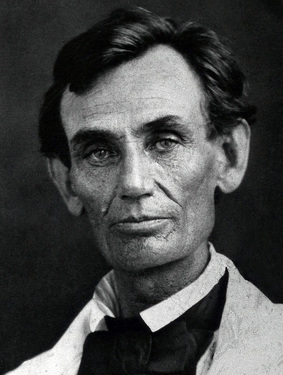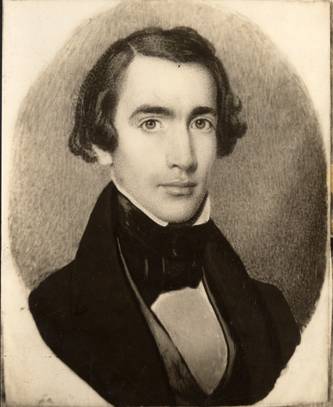|
April 15, 2015 is the 150th anniversary of the death of Abraham Lincoln. This sesquicentennial is as good an excuse as any for considering one of the least known aspects of America’s best-known President, his intimate relationship with Joshua Speed. Although their five-year love affair has not gone without comment, it has probably never had as careful a review as that given in 2001 by Jonathan Ned Katz in Love Stories: Sex between Men Before Homosexuality. Most admissions of the sexual nature of Lincoln’s affection for Speed, beginning with Carl Sandburg’s classic biography of Lincoln in 1926 are marred by the attempt to view their love out of context. Sandburg was embarrassed by their relationship and obfuscated quite homophobically, “A streak of lavender ran through [them], [they] had spots soft as May violets.” In our own time authors put Speed and Lincoln into homosexual, heterosexual or bi-sexual pigeon holes.
This mistake, to pigeon-hole anachronistically, is routinely made in historical retrospectives. That, in fact, is what makes timely still another look at what it meant that Abraham Lincoln and Joshua Speed slept together beginning in 1837 and had a relationship, as Speed described it, in which “no two men were ever more intimate.” William Herndon, Lincoln’s law partner and biographer said Lincoln “loved this man [Speed] more than anyone dead or living.” What, exactly, went on between 28 year-old Lincoln and his 24 year-old friend? Katz expounds on it in analytical detail. In brief, Lincoln and Speed shared a bed, a very common arrangement in the 19th century. They shared acute anxiety over the prospects of any initial sexual encounter with a “good woman.” They collaborated on at least one liaison with a prostitute that Lincoln did not consummate, claiming (as was becoming a pattern for him) inadequate funds. They reveled in very easy fellowship with young men. Their separation was emotionally wrenching, especially for Lincoln who sought medical help and escape into work. Then, loaded with trepidation, as their correspondence documents, they separated and married good women they feared. Modern thinking would conclude that maybe Lincoln and Speed had no sexual relationship at all; but on the other hand, failure on their part to recognize a sexual attraction hidden in their emotion-laden friendship did not mean their friendship did not have a sexual component. Again, Katz insists, that veers away from context. In the 19th century the separation of the physical from the spiritual was accepted as reality. What we have to go on are surviving letters from Lincoln to Speed as they anticipated marriages they dreaded. In those letters Katz discerns several threads. Lincoln hoped that Speed would return to Springfield, and therefore to Lincoln. He hoped Speed would find happiness in his relationship with his fiancée but “our friendship is eternal.” He counseled Speed to be patient about the consummation of the marriage, since “Elysium” [Paradise] is unattainable in this life. Nevertheless, eventually sexual satisfaction is some compensation for the loss of a bachelor’s freedom and friendships. Later, Lincoln expresses joy that Speed is happier in his marriage than either of them expected him to be. Altogether, Lincoln’s letters to Speed, corroborated by ample evidence from Herndon and others, show that Lincoln was in love with Joshua Speed. They had an emotional bonding that Lincoln never achieved with any other man or woman. This love in the Romantic era of the early-nineteenth century was the essence of a same-sex relationship in a way that a physical relationship involving genital contact could never have signified or amplified. At that time physical sex would have sullied and possibly destroyed such sublime love as Lincoln shared with Speed. Was there an illicit, guilt or shame-inducing aspect to Lincoln’s love for Speed and Speed’s ardent responses? That, indeed, may be the measure that Katz disregards. We tend to believe that homo-erotic relationships were dreaded and stigmatized in the 19th century because same-sex incidents were vilified. Since there is no contemporary evidence of shame in Lincoln’s letters to Speed or in Herndon’s narrations a little later, we would conclude their relationship “must not have been homo-erotic.” Instead, it is more likely that emotional love was not stigmatized in the 1830s as it was later with the development of the Victorian moral code and suspicion of all psychological states and any physical ones that were not chaste or devoid of emotion. When Abraham Lincoln loved Joshua Speed it was still OK for two men to love each other and to say so.
1 Comment
Lance Woodruff
4/18/2015 10:51:37 pm
Ken, Thanks for this interesting discussion. I look forward to reading more about Lincoln, a truly impressiveperson and president.
Reply
Leave a Reply. |
AuthorRev. Dr. Kenneth Dobson posts his weekly reflections on this blog. Archives
March 2024
Categories |
| Ken Dobson's Queer Ruminations from Thailand |
|


 RSS Feed
RSS Feed
